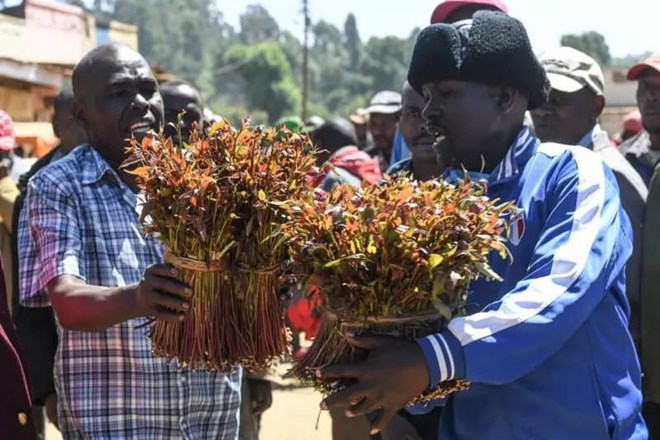
Thursday February 20, 2025

Vendors exchange bundles of khat (miraa) at a market in Kenya, where the stimulant leaf is widely cultivated and traded. Khat remains a key economic crop in the region but faces increasing scrutiny due to its social and health impacts, particularly among youth. GETTY IMAGES
NAIROBI, Kenya (HOL) — Community elders in Sala, a town in Mandheera County, northeastern Kenya, have issued a sweeping ban on khat consumption and trade, warning that violators may face social exclusion, denied marriage prospects, and even religious rites.
The elders, speaking at a press conference this week, declared that khat—a mild stimulant widely consumed in the Horn of Africa—was undermining community values, particularly affecting young people and students.
“Khat may no longer be sold or consumed in town. Men who chew khat will not be given brides, and those who do not pray will not be granted Islamic funeral prayers,” said Aadan Daahiye Qoriyow, a leading elder in the region.
The decree, which was announced after months of deliberations, primarily targets habitual khat users whom the elders blame for family neglect, student drug abuse, and social decay.
The elders insist that the funeral restrictions apply only to khat users who fail to observe Islamic prayers, a move that has stirred debate. However, Daahiye clarified: “This is not about targeting khat chewers indiscriminately. If they pray, they will be advised to reform rather than being denied religious rites.”
Before implementing the ban, the elders conducted a four-month-long awareness campaign warning about khat’s economic and social consequences.
“We engaged the local community. Four women and one man who used to sell khat have now transitioned to other businesses,” said Daahiye. “The awareness efforts paid off.”
The move aligns with broader anti-khat efforts in Kenya. Last year, the governors of Mombasa, Kilifi, and Taita Taveta counties issued executive orders banning khat trade—explicitly targeting the potent Muguka variety—before President William Ruto overturned the decision, citing its legality as a commercial crop.
The Muguka ban had sparked backlash, particularly among farmers in central Kenya, where khat cultivation is a major economic driver. However, officials justified the restrictions, arguing that khat was linked to youth delinquency and addiction.
Khat contains cathinone and cathine, psychoactive compounds that induce mild euphoria but are less potent than amphetamines. Despite its widespread use, prolonged khat consumption has been associated with mental health issues, increased aggression, and financial strain.
“Many students are now consuming khat, and we are seeing cases of prescription drug abuse among the youth. Women are also complaining that their husbands, addicted to khat, have abandoned their financial responsibilities,” said Daahiye.






